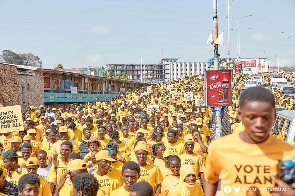 Supporters of Alan Kyerematen's party
Supporters of Alan Kyerematen's party
Under the Fourth Republic, intra-party factions have witnessed a series of adverse effects in both the NPP and the NDC. Factionalism strongly began with the anti-Rawlings faction backing former President John Evans Atta Mill's renomination, christened 'Get Atta Mills Endorsed' (GAME) and pro-Rawlings support for the former first lady's FONKAR. This was after the loss of the 2000 Presidential election by Atta Mills to former President John Kufour of the NPP.
After the presidential primary, former President John Evans Mills of GAME massively defeated the former First Lady Nana Konadu of KONKAR in 2011.
Nana Konadu decided to form her political party to be part of the 2012 presidential election. That couldn’t affect the fortunes of the NDC. The NDC went ahead and won the election.
Well, those were a great lesson for over-ambitious politicians to learn from Atta Mill's resounding victory (96.9%). Technically, it meant that there wasn't a clear, undisputed opposition within the ranks of the party.
In the early history of political sentiments, the rivalry between the Danquah and Busia factions was traced historically to the Asante and Akyem tribes. Even in recent times, internal politics of the NPP, the Asante and Akyem blocs still feature.
It isn't there is a rivalry in the ideological path of the NPP between these prominent politicians who are from different known rival ethnic groups. However, the disagreements herein, are about group interest, personal liberty, development, ego, and control.
Political parties are made up of diverse interest groups, and within such organizations competition often leads to disagreement over policy goals and how to implement them (Kitschelt 1989). The functions of parties in Africa are often said to differ considerably from those in advanced industrial democracies.
Indeed, many Africanist political scientists have argued that political parties have largely been the ‘vehicles of individual politicians’ or ‘ethnic mobilisation’ (Boafo Arthur 2003; Mozaffar et. While some political parties fit this stereotype, the evidence from Ghana suggests something very different: the institutionalization of political parties and an emergent two-party system set Ghana apart from other African countries (Daddieh & Bob-Milliar 2012; Whitfield 2009). Nevertheless, factions appear to be common among political parties in Africa and elsewhere (e.g. Cheeseman & Hinfelaar 2009; Koger et al.
Furthermore, in the recent presidential primary election in the NPP, the Akyem bloc forcefully demonstrated its quest for someone from the Dombo faction until recently were only Busia - Danquah tradition became the party’s flag-bearer. Their reasons for supporting him: a current vice-president, loyal, competent, and stands very tall 'breaking the 8' mantra was seen more or less as Akyem's fight. They never disappointed him because they wanted someone from the Dombo faction to represent their collective interest.
However, realistically, I don't see the need for political watchers to compare Atta Mill's performance(96.6) in the presidential primary election of the NDC to the recent one in the NPP. Even though, there was a breakaway by Nana Konadu to form a new political party. She got a little over 3% compared to that of Dr. Bawumia, who had a little over 61% in the NPP presidential primary election, over 37% of another person in the race. This certainly shows that many people in the NPP didn't want Dr. Bawumia to become a flag-bearer. And so, there is a breakaway by one of the leading members of the party to create a movement.
Nana Konadu's breakaway and the formation of a new political party couldn't have affected the NDC in the 2012 presidential election because her performance was abysmal in the presidential primary, where she got only 3%.
However, the events unfolding in the NPP particularly, the recent health walk in Kumasi by the Butterfly movement, clearly show that the former's fortunes in its stronghold will be impacted negatively by the latter partaking in the 2024 presidential election.
No doubt about this claim. It cannot be treated with contempt.
As a matter of fact, the activities of the Butterfly Movement transcend intra-party factions. It betrayed an intra-party combination of a sort many political writers had pontificated in their various write-ups. That, you stay within and fight rather than break away and fight.
“We might define a faction as any intra-party combination, clique, or grouping whose members share a sense of common identity and common purpose and are organized to act collectively – as a distinct bloc within the party – to achieve their goals. These goals may include any, several, or all of the following: patronage (control of party and government office by members of the faction), the fulfillment of local, regional, or group interests, influence on party strategy, influence on party and governmental policy, and the promotion of a discrete set of values to which members of the faction subscribe. “George M. Bob-Milliar(December, 2012).
Moreover, Zariski’s postulation is still valid because it allows for the analysis of different types of intra-party groupings, and delineates a wide range of party members’ motivations for factional activity. Thus, factions should be viewed simply as loose or informal groups within a larger institutionalized group.
And so, it should be in the interest of the leadership of the NPP to work on minimizing the effects of the long-standing feud between the Akyem and Asante ethnic groups in future elections rather than debunking claims of its existence in the party. Nonetheless, it is difficult to achieve in a short time, since the water has been muddied already.
The butterfly movement crafted out of the NPP is going to draw many votes from its stronghold (Ashanti region) in the 2024 presidential election. There are no buts or maybes in this claim.
Their agenda in my opinion is not to win the next presidential election, but to send the NPP packing to the opposition.